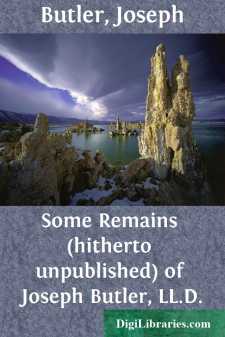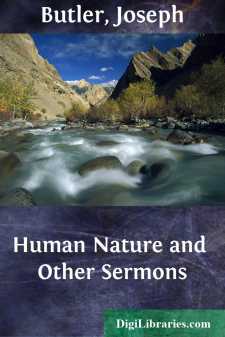Categories
- Antiques & Collectibles 13
- Architecture 36
- Art 48
- Bibles 22
- Biography & Autobiography 813
- Body, Mind & Spirit 142
- Business & Economics 28
- Children's Books 16
- Children's Fiction 13
- Computers 4
- Cooking 94
- Crafts & Hobbies 4
- Drama 346
- Education 46
- Family & Relationships 57
- Fiction 11829
- Games 19
- Gardening 17
- Health & Fitness 34
- History 1377
- House & Home 1
- Humor 147
- Juvenile Fiction 1873
- Juvenile Nonfiction 202
- Language Arts & Disciplines 88
- Law 16
- Literary Collections 686
- Literary Criticism 179
- Mathematics 13
- Medical 41
- Music 40
- Nature 179
- Non-Classifiable 1768
- Performing Arts 7
- Periodicals 1453
- Philosophy 64
- Photography 2
- Poetry 896
- Political Science 203
- Psychology 42
- Reference 154
- Religion 513
- Science 126
- Self-Help 84
- Social Science 81
- Sports & Recreation 34
- Study Aids 3
- Technology & Engineering 59
- Transportation 23
- Travel 463
- True Crime 29
Joseph Butler
Joseph Butler (1692–1752) was an English philosopher, theologian, and Anglican bishop, best known for his work in ethics and moral philosophy. His most influential book, "The Analogy of Religion," published in 1736, defends Christian faith against deism by drawing analogies between natural law and religious belief. Butler also wrote "Fifteen Sermons," which explores human nature, self-interest, and conscience, contributing significantly to the development of modern ethical theory. As Bishop of Durham, his works influenced both religious thought and secular philosophy in the 18th century.
Author's Books:
Sort by:
by:
Joseph Butler
PREFACE. It has long been a subject of regret that we should have so few remains of so great a writer as the author of the “Analogy,” not only the greatest thinker of his day, but one almost equally remarkable for his personal religion and amiability. The few fragments and letters which remain unpublished, derive from this circumstance a value wholly incommensurate with their extent, though, as to...
more...
by:
Joseph Butler
INTRODUCTION. Joseph Butler was born in 1692, youngest of eight children of a linendraper at Wantage, in Berkshire. His father was a Presbyterian, and after education at the Wantage Free Grammar School Joseph Butler was sent to be educated for the Presbyterian ministry in a training academy at Gloucester, which was afterwards removed to Tewkesbury. There he had a friend and comrade, Secker, who...
more...



